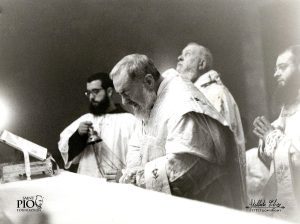VATICAN CITY (CNS) – A foundation that promotes devotion to St. Pio of Pietrelcina, more widely known as Padre Pio, is making 10 never-before-seen photographs of the saint available to the devout for free.
The images provide personal insight into the life, attitude and spirituality of 20th-century saint, said the photographer. Some photos show Padre Pio solemnly celebrating Mass while in others he is smiling while surrounded by his confreres.

Elia Stelluto, Padre Pio’s personal photographer, stood proudly — camera in hand — before posters of the 10 new images for the presentation of the photos in the Vatican movie theater April 29.
“It’s enough to look at one image of his face” to understand Padre Pio, he told Catholic News Service. “With that you can understand so much; each photo has its own story, one must at them look one by one and that way you see so much more in his expressions.”
Stelluto photographed the saint for decades at the convent where he lived in San Giovanni Rotondo, Italy.
During the photo presentation, Andrea Tornielli, editorial director of the Dicastery for Communication, said the new photos highlight Padre Pio’s identity as someone who was close to those around him and was filled with joy. He said that although it was not customary to smile in photos at the time, candid photos taken by Stelluto show the saint beaming broadly as he was huddled in a group.
Luciano Lamonarca, founder and CEO of the Saint Pio Foundation which promotes devotion to the Italian saint and organized the publication of the photos, said many people would come to Stelluto requesting his photos for articles and books.
“I never saw any kind of availability for the people” to see the photos directly, he said. That’s why he thought, “Padre Pio is the saint of the people, we must do something for the people.”
Lamonarca, an Italian who lives in the United States, said since many people with a devotion to Padre Pio are unable to visit the areas where the saint lived and ministered, he asked himself, “how does one bring Padre Pio to them, the true Padre Pio, the most authentic form of Padre Pio?”
That’s what spurred him to partner with Stelluto to make the photos available to the public, excluding their use for commercial purposes, by being free to download via the St. Pio Foundation website.
Lamonarca said he hoped that by “looking at the image of a greatly suffering father who could also laugh,” people would think to themselves, “if he could laugh, we can laugh too.”
Stelluto described the images he had taken of Padre Pio as “mysterious,” since they always came out clearly despite dark lighting conditions.
He recalled the challenge of taking photos in a dark convent, coupled with Padre Pio’s distaste for the flash of a camera, especially during Mass, and exclusive use of dim candles to light the altar.
“It’s not that I was talented in doing this, I still don’t understand the thing,” Stelluto said during the photo presentation. “The truth is that he was the source of light.”
